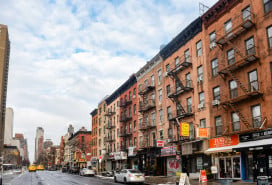Renting in NYC after college? 6 ways your apartment hunt will probably shock you

Moving to NYC after graduation? Yay! But buckle up because you're about to rent in one of the most complex—and expensive—real estate markets on the planet.
iStock
If you’re planning a move to New York City after graduation, brace yourself. Even if you’ve been renting an off-campus apartment and have a lease or two under your belt, renting in one of the most competitive and expensive cities in the world can be even more complex and stressful than starting your senior thesis during finals week.
“It’s a different reality, and students can be very overwhelmed,” says Karen Stone, a broker at Halstead.
She should know. For the past decade, Stone has prepared students to move here from schools like her alma mater Indiana University, Wharton School of Business, the University of Michigan, and others. Needless to say, she’s seen plenty of deer-in-the-headlights looks as she schools students on the ins and outs of NYC real estate.
To get your own rude awakening over with in plenty of time to prepare, read on:
Shock #1: I have to make HOW MUCH a year to rent a NYC apartment?!
This one “surprises students the most,” Stone says. In order to financially qualify for an apartment in NYC, most landlords require your annual salary to be at least 40 times your monthly rent. So if your rent is $2,000, for example, you’ll need to earn at least $80,000. If you and your roommates are renting a $5,000 per month apartment, your combined annual incomes will need to be $200,000.
Can't meet the income threshhold? You’ll need a guarantor to cover the lease if you default—typically, this must be a relative earning 80 times the annual rent who lives in the tri-state area. Alternatively, you can an institutional guarantor such as Insurent (a Brick Underground sponsor), who you pay to act as your guarantor.
Shock #2: I have to pay THAT MUCH upfront?!
Before you even move into a NYC apartment, you’re going to need to shell out quite a bit of money upfront, which comes as another big surprise for students, says Stone.
Most NYC landlords require you to pay your first month’s rent and a security deposit, which is generally a month’s rent, but can be more depending on your credit. Say you and a roommate are splitting a $3,500-a-month apartment. Your half of the rent is $1,750, so you’ll have to come up with an extra $3,500 yourself to cover your portion of the first month’s rent and security deposit.
Plus, you’ll likely have to pay a non-refundable application charge, which typically ranges from $50 to $200 per person—and we haven’t even factored in a fee paid to a real estate broker, if you use one to find an apartment. (See Shocker #3, below.).
To give yourself some breathing room, try to save up at least four month’s worth of rent before moving here. Stone also urges you to use a national bank with branches in NYC instead of a small, local bank or credit union “so if you need to get money quickly for the down payment, you can access it.”
Shock #3: Broker fees
As you scroll through NYC apartment listings, you’ll see the term “no fee” pop up often. That means one of two things: That you’ll be renting directly from a landlord or management company, or, if you used an agent to help you find a place, the landlord or management company is paying the broker fee as a renter concession (aka an incentive to entice you to sign a lease).
If you’re from out of town, working with a good broker certainly has its benefits. They know the city and current availabilities, so they can vet apartments and neighborhoods to find something that suits your needs and budget, plus help you navigate what can be a tricky application process.
But taking advantage of their expertise could cost you anywhere from one month's rent up to 12 to 15 percent of your annual rent. If your rent is, say, $2,900, the current median in Brooklyn, you’re looking at a fee between $2,900 and $5,200. And yes, that, too, is upfront—and in addition to the costs we covered in Shock #2.
If you’d rather apartment hunt on your own to avoid paying a hefty broker fee, here are the eight best websites for finding a no-fee rental in NYC.
Need help finding the perfect starter apartment in the right neighborhood--or a landlord inclined to be flexible about guarantors, work history, rental history, or "flexing" your space with temporary walls? Place your search into the capable hands of The Agency, a tech-savvy real estate brokerage that's helped hundreds of Brick Underground readers find their ideal NYC apartments. Bonus: The agents at The Agency are not only a delight to deal with, they will charge a broker's fee of 10 percent of a year's rent on open listings instead of the usual 12 to 15 percent if you sign up here.
Shock #4: The advertised rent isn’t necessarily the rent you’ll pay
Another concession landlords may offer is a free month or two, which of course is great, but then they use that discounted rent as the advertised or net effective rent, and this is where things get confusing for even seasoned NYC renters. The gross rent--the amount of rent you’ll actually pay--can be more expensive.
If your max budget is $3,300, and you search accordingly and find a place with a net effective rent of $3,300 with one month free on a 12-month lease, your gross rent could actually be $3,600 according to your lease, though you will get a free month at some point--typically at the end of your lease.
If math is not your forte, it takes just a second to figure out how much you’ll actually pay using Brick Underground’s new Gross Rent Calculator, below.

Brick Underground's
Gross Rent Calculator
What's this?
Some New York City landlords offer a free month (or more) at the beginning or end of a lease. The advertised rent is the net effective rent. The net effective rent is less than the amount you will actually have to pay --- known as your gross rent --- during your non-free months.
Brick Underground's Gross Rent Calculator enables you to easily calculate your gross rent, make quick apples-to-apples comparisons between apartments and avoid expensive surprises. All you'll need to figure out your gross rent is 1) the net effective rent, 2) the length of your lease, and 3) how many free months your landlord is offering. [Hint: Bookmark this page for easy reference!]
To learn more about net effective versus gross rents, read What does 'net effective rent' mean?.
If the landlord is offering partial months free, enter it with a decimal point. For example, 6 weeks free rent should be entered as 1.5 months.
Shock #5: Here today, gone today
Remember when we said that NYC’s real estate market is competitive? Students are shocked by how fast real estate can move here, Stone says, and you likely will be, too.
Rents start to tick up in May and peak in the summer months, the timeframe when you’ll be apartment hunting with lots of other fresh-faced grads.
The good news is there’s plenty of rental inventory these days, but if you find a place you like, you’ll want to snatch it up fast before someone else does. That means starting the application process and paying those upfront costs to lock it in because if you don’t, there’s no guarantee it’ll be there tomorrow—or even later today if you want to think about it.
“One student saw an apartment and signed a lease within three hours,” Stone says.
Shock #6: It can take an hour to commute three miles
Students tell Stone they’ll be comfortable living within three miles of work, which back home may be a quick five- or 10-minute drive, but in NYC, three miles can take you through New Jersey, Brooklyn, or Queens.
“They don’t quite understand that a three-mile commute could take an hour and a half—or more,” says Stone.
The first thing you should do is figure out is what subway(s) are in close proximity to your office, and start looking along that train line or the ones that easily connect to them. But know that you’ll pay extra to live near a subway—and that rents can vastly differ neighborhood by neighborhood and borough by borough.
For other things you should keep in mind, check out 15 things real New Yorkers look for in a new neighborhood, the 10 best NYC neighborhoods for college grads (based on factors like affordability, commute to Midtown and the Financial District, nightlife, safety, and more), and Brick’s guide to moving to NYC after college.
You Might Also Like































